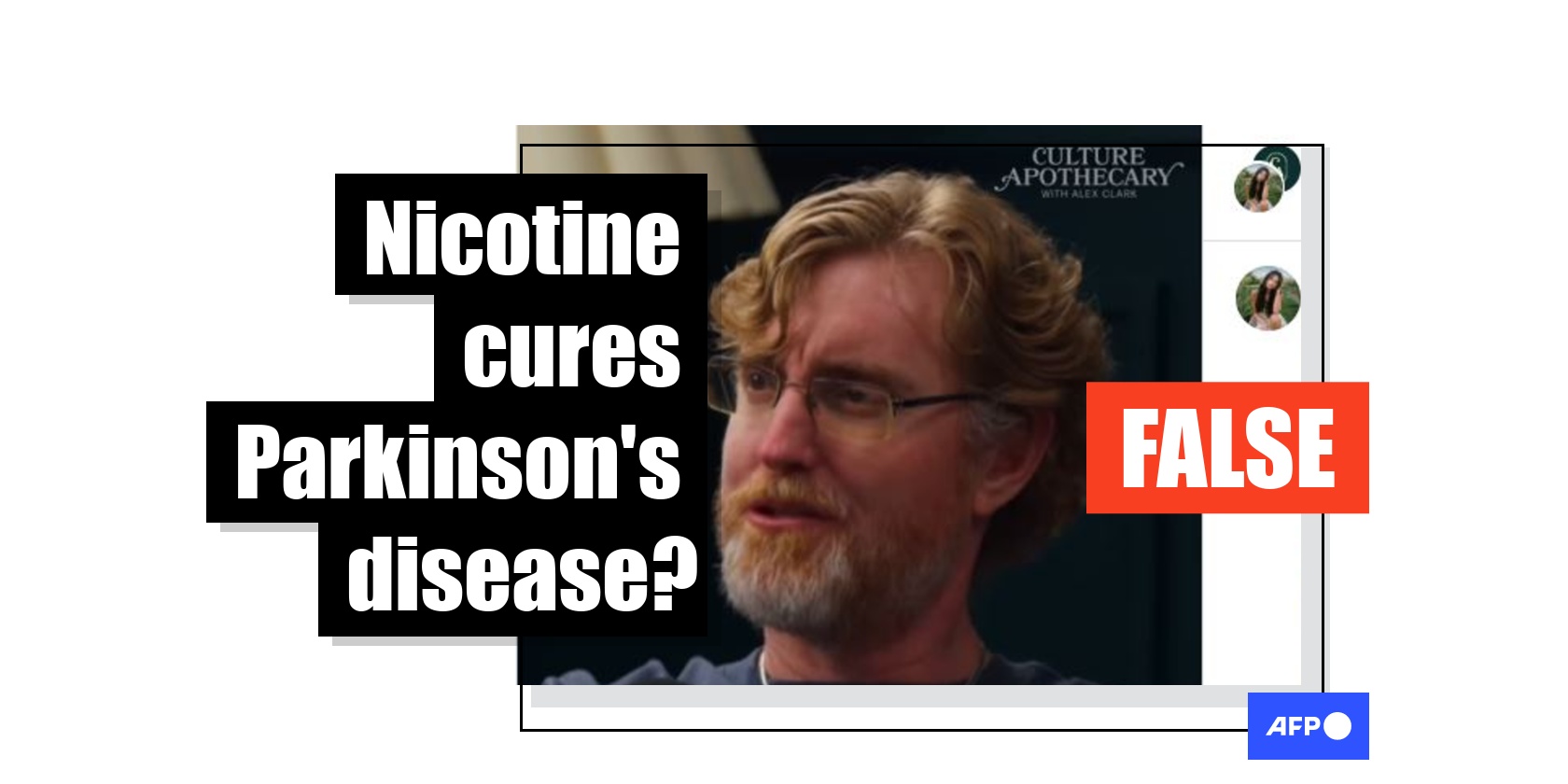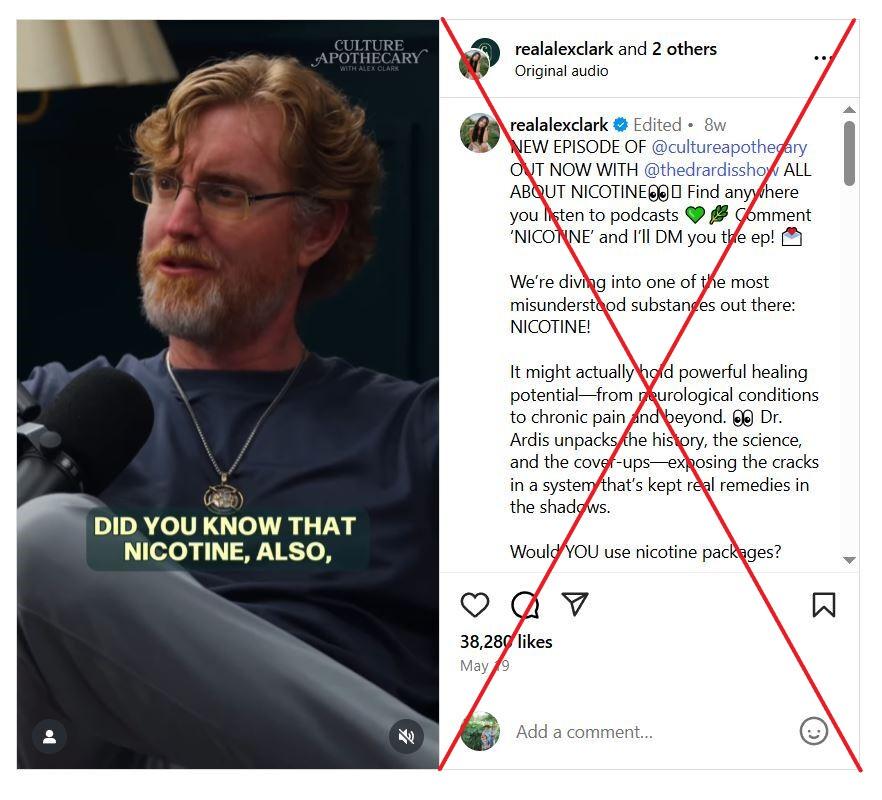
Health influencer falsely claims nicotine can cure neurological disorders
- Published on July 18, 2025 at 22:56
- 5 min read
- By Caleigh KEATING, AFP USA
"Nicotine is not addictive. Parkinson's disease can be prevented and can be cured, and its symptoms reversed, with nicotine alone," health influencer Byran Ardis says in a video teasing an episode of the "Culture Apothecary" podcast from Alex Clark, a leading voice in the "Make America Healthy Again" movement.
Ardis, whom AFP has previously fact-checked for spreading health misinformation, goes on to claim: "Nicotine is known by medical science to be a curative agent and a preventative agent for Alzheimer's. Did you know nicotine could also cure the symptoms of hypothyroidism?" He also asserts that "glioblastomas were proven in 2021 to be cured by nicotine alone."
The clip has attracted tens of thousands of interactions on Instagram since May 19, 2025. Ardis's endorsement of nicotine patches continued to be shared across platforms in July, alongside other edits of the conversation, including one Clark posted on YouTube.

But nicotine is an addictive chemical, and the only use for nicotine patches approved by the US Food and Drug Administration (FDA) is to quit smoking (archived here and here).
"Don't use nicotine, other than trying to help quit smoking," Edward Levin, chief of the Neurobehavioral Research Lab at Duke University Medical Center, told AFP July 14 (archived here).
He said the effect of nicotine on cognition, depression, Parkinson's or Alzheimer's "has not been proved, so it's still under investigation."
Parkinson's disease
In the podcast, Ardis claims nicotine by itself can prevent, cure or reverse symptoms of Parkinson's disease.
Scientists are exploring nicotine's potential as a Parkinson's treatment due to the chemical's dopamine-increasing properties and the fact that smokers develop Parkinson's at a lower rate, but research has yielded mixed results (archived here).
"Nicotine does potentially up the release of dopamine, and dopamine is what is impaired in Parkinson's disease. So the rationale for it is there, but the proof of it is not," Levin said.
"To say flat out that it does prevent or cure Parkinson's just is not true."
A 2015 study by the Parkinson's Institute concluded that nicotine could hold promise in terms of protecting against nerve degeneration, alleviating symptoms and reducing side effects of other drugs used to treat the disease (archived here). However, the study stops short of recommending nicotine as a proven treatment, saying instead that it "may represent a new disease modifying approach."
A 2021 literature review published in Molecular Medicine Reports said nicotine may slow the progression of the disease by improving memory impairment and dyskinesia (archived here).
Conversely, a trial supported by the Michael J. Fox Foundation showed nicotine patches did not slow the progression (archived here).
"Despite some initially promising findings from animal models and correlational studies in humans, this has not translated well to clinical trials," Maggie Sweitzer, an associate professor in psychiatry and behavioral sciences at Duke University, told AFP in a July 15 email (archived here).
"I am not aware of any solid evidence to support nicotine as a treatment in Parkinson's disease."
Alzheimer's disease
Ardis's second claim is that nicotine is "known by medical science" to be a curative and preventative agent for Alzheimer's disease.
Researchers in the United States are currently investigating the effects of nicotine on mild cognitive impairment, a precursor to Alzheimer's, as part of the "Memory Improvement Through Nicotine Dosing" (MIND) study (archived here). But nicotine has not been incorporated into human treatment beyond clinical trials.
A 2012 trial focused on 67 subjects concluded that nicotine led to cognitive improvement in attention, memory and processing, but it said further study would be necessary to determine if the findings were clinically important (archived here). A much larger follow-up is currently in progress, with results expected later in 2025 (archived here).
Levin, a researcher on the MIND study, said despite promising findings, nicotine patches have not yet been FDA approved to protect against cognitive decline.
"I can't recommend it," Levin said. "It's not FDA approved for that purpose. It's under investigation."
Levin said that if nicotine patches were implemented as a treatment for Alzheimer's or other cognitive diseases, they would likely be used alongside other drugs, rather than alone.
He also pushed back on Ardis's claim that it is safe to place nicotine patches on children, saying the drug is toxic from early fetal development through adolescence and can adversely impact the nervous system (archived here).
Glioblastoma
Ardis then claims nicotine alone was proven in 2021 to cure glioblastoma, an aggressive form of brain cancer.
AFP did not find a reference with such clear proof. Instead, a 2021 paper in Pharmacological Research showed nicotine can promote the proliferation of glioblastoma cells, with nicotinic receptors potentially contributing to the tumor's aggressive behavior (archived here). The paper also discovered that drugs that block nicotinic receptors can decrease glioblastoma cell growth.
An earlier literature review said smoking and other uses of tobacco and nicotine during treatment can detrimentally affect a patient's prognosis (archived here).
Keyword searches did reveal a 2022 in vivo study which found that nicotine, in conjunction with lithium carbonate, can suppress and kill glioblastoma cells, although the study also warns of health risks resulting from nicotine's cytotoxicity (archived here).
But such findings have not been replicated outside of in vivo cell studies, and Sweitzer said it would be difficult to study the isolated effect of nicotine on glioblastoma in a clinical setting.
"It would be unethical for researchers to assign patients with glioblastomas to a treatment condition where they received 'nicotine alone' in the absence of usual standard of care, because this would deprive the patients of treatment that they would receive if they were not in the study," Sweitzer said.
"In general, people should be highly skeptical about claims that something has been 'proven' in health and medicine."
Lead Stories and Medical Dialogues previously debunked claims by Ardis that nicotine can cure brain tumors in as little as 72 hours.
Hypothyroidism
Finally, Ardis poses that nicotine could cure symptoms of hypothyroidism, a thyroid gland condition that can lead to high cholesterol and heart problems.
The 2021 Molecular Medicine Reports literature review said nicotine may "activate thyroid receptor signaling pathways" to improve hypothyroidism-induced memory impairment (archived here).
But Sweitzer said Ardis's claim misleads.
"There are interactions between nicotine and thyroid hormones that have been clearly demonstrated in animal models," Sweitzer said (archived here and here). "But I am not aware of any evidence that would suggest nicotine can be used as a treatment in itself."
Rexford Ahima, director of the division of endocrinology, diabetes and metabolism at Johns Hopkins University, agreed (archived here).
"Nicotine does not cure hypothyroidism," Ahima told AFP in a July 15 email. "Nicotine use, especially through smoking, is linked to worsening of autoimmune hyperthyroidism."
AFP has debunked other health misinformation here.
Copyright © AFP 2017-2026. Any commercial use of this content requires a subscription. Click here to find out more.
Is there content that you would like AFP to fact-check? Get in touch.
Contact us
